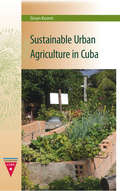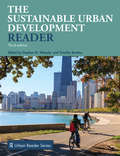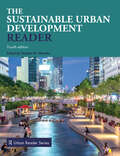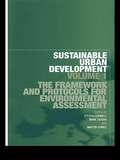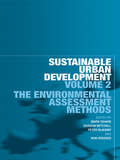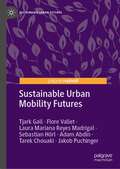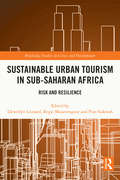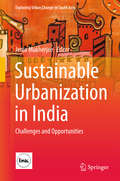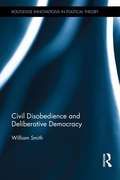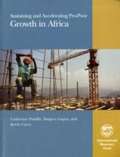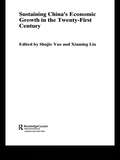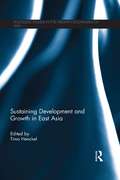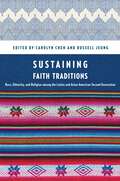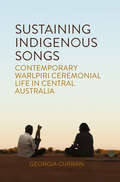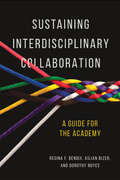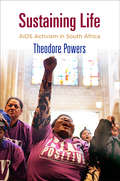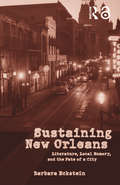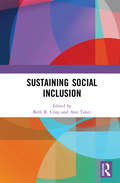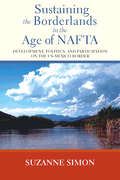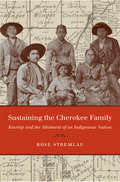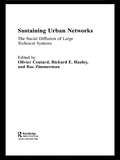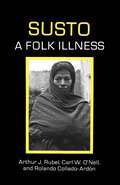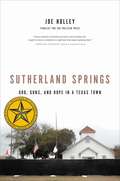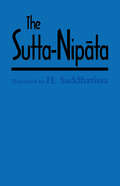- Table View
- List View
Sustainable Urban Agriculture in Cuba: Sustainable Urban Agriculture In Cuba (Contemporary Cuba)
by Sinan Koont"Pushed by necessity but enabled by its existing social and educational policies, Cuba in the 1990s launched the most extensive program of urban sustainable agriculture in the world. This study is to date the only book-length investigation in either English or Spanish of this important national experiment in transforming the environmental, economic, and social nature of today's dominant system of producing food."--Al Campbell, University of Utah As large-scale industrial agriculture comes under increasing scrutiny because of its petroleum- and petrochemical-based input costs and environmentally objectionable consequences, increasing attention has been focused on sustainable, local, and agro-ecological techniques in food production. Cuba was forced by historical circumstances to be one of the pioneers in the massive application of these techniques. After the demise of the Soviet Union in the early 1990s, Cuba was left without access to external support needed to carry on with industrial agriculture. The economic crisis led the country to reconsider their former models of resource management. Cuba retooled its agricultural programs to focus on urban agriculture--sustainable, ecologically sound farming close to densely populated areas. Food now takes far less time to get to the people, who are now better nourished because they have easier access to whole foods. Moreover, urban farming has become a source of national pride--Cuba has one of the best urban agriculture programs in the world, with a thousand-fold increase in urban agricultural output since 1994. Sinan Koont has spent the last several years researching urban agriculture in Cuba, including field work at many sustainable farms on the island. He tells the story of why and how Cuba was able to turn to urban food production on a large scale with minimal use of chemicals, petroleum, and machinery, and of the successes it achieved--along with the continuing difficulties it still faces in reducing its need for food imports.
Sustainable Urban Development Reader (Routledge Urban Reader Series)
by Timothy Beatley Stephen M. WheelerBuilding on the success of its second edition, the third edition of the Sustainable Urban Development Reader provides a generous selection of classic and contemporary readings giving a broad introduction to this topic. It begins by tracing the roots of the sustainable development concept in the nineteenth and twentieth centuries, before presenting readings on a number of dimensions of the sustainability concept. Topics covered include land use and urban design, transportation, ecological planning and restoration, energy and materials use, economic development, social and environmental justice, and green architecture and building. All sections have a concise editorial introduction that places the selection in context and suggests further reading. Additional sections cover tools for sustainable development, international sustainable development, visions of sustainable community and case studies from around the world. The book also includes educational exercises for individuals, university classes, or community groups, and an extensive list of recommended readings.The anthology remains unique in presenting a broad array of classic and contemporary readings in this field, each with a concise introduction placing it within the context of this evolving discourse. The Sustainable Urban Development Reader presents an authoritative overview of the field using original sources in a highly readable format for university classes in urban studies, environmental studies, the social sciences, and related fields. It also makes a wide range of sustainable urban planning-related material available to the public in a clear and accessible way, forming an indispensable resource for anyone interested in the future of urban environments.
The Sustainable Urban Development Reader (Routledge Urban Reader Series)
by Stephen M. WheelerThis thoroughly revised and updated fourth edition of The Sustainable Urban Development Reader combines classic and contemporary readings to provide a broad introduction to the topic that is accessible to general and undergraduate audiences. The Reader begins by tracing the roots of the sustainable development concept in the nineteenth and twentieth centuries through classic readings. It then explores dimensions of urban sustainability, including land use and urban design, transportation, ecological planning and restoration, energy and materials use, economic development, social and environmental justice, and green architecture and building. Additional sections cover tools for sustainable development, sustainable development internationally, visions of sustainable community, and case studies from around the world. The Sustainable Urban Development Reader remains unique in presenting a broad array of sustainable city readings, each with a concise introduction placing it within the context of this evolving discourse. Presenting an authoritative overview of the field using original sources in a highly readable format, this book is a valuable resource for general readers as well as students and researchers in urban studies, environmental studies, the social sciences, and related fields.
Sustainable Urban Development Volume 1: The Framework and Protocols for Environmental Assessment (Sustainable Urban Development Series #Vol. 1)
by Steven Curwell Mark Deakin Martin SymesBased on original research, this first volume of a set of groundbreaking new books sets out a framework for analyzing sustainable urban development and develops a set of protocols for evaluating the sustainability of urban development. Protocols included are for sustainable urban planning, urban property development, urban design, the construction, operation and use of buildings. Using these protocols, the book goes on to provide a directory of environmental assessment methods for evaluating the sustainability of urban development and also maps out how these assessment methods are being transformed to evaluate the environmental, economic and social sustainability of urban development. Web-based applications are increasingly being used to support this transformation and the contributors deftly cover this application and issues concerning the use of information and communication technologies for evaluating the sustainability of urban development are also dealt with. With its multidisciplinary approach, Sustainable Urban Development presents key new material for postgraduates and professionals across the built environment.
Sustainable Urban Development Volume 2: The Environmental Assessment Methods (Sustainable Urban Development Series #Vol. 2)
by Mark Deakin Gordon Mitchell Peter Nijkamp Ron VreekerIn this book, the second of a three-volume series, leading authorities on the methodology of environmental assessment provide a unique insight into questions of critical importance to sustainable urban development. Using the framework and protocols set out in Volume 1, Volume 2 examines how well the environmental assessment methods evaluate the ecological integrity of urban development and equity of the resulting resource distribution. The examination focuses on: the instruments of environmental assessment approaches to environmental assessment based in systems-thinking methods for environmental, economic and social assessments their use in evaluating the sustainability of urban development. The Sustainable Urban Development Series contains the research and debate of the BEQUEST (Building, Environmental Quality Evaluation for Sustainability) network funded by the European Commission. Together the books provide a framework, set of protocols, environmental assessment methods and toolkit for policy makers, academics, professionals and advanced level students in urban planning and studies, as well as other areas of the built environment.
Sustainable Urban Mobility Futures (Sustainable Urban Futures)
by Tjark Gall Flore Vallet Laura Reyes Madrigal Sebastian Hörl Adam Abdin Tarek Chouaki Jakob PuchingerThis book provides a unique perspective on urban mobility focusing on past challenges and future trends. The book enables discussions of pathways towards sustainable and people-centred urban mobility building on existing concepts and introducing novel methods and consideration of future research. In particular, the book provides an overview of trends, design methods, and projects combining foresight and agent-based modelling to better integrate active mobility in Mobility-as-a-Service, assess impacts of automated vehicles in Paris, and compare multiple solutions in Cairo. The book provides a range of multidisciplinary concepts and methods that will be invaluable to both researchers in the field and students taking relevant courses.
Sustainable Urban Tourism in Sub-Saharan Africa: Risk and Resilience (Routledge Studies in Cities and Development)
by Llewellyn Leonard Regis Musavengane Pius SiakwahThis book investigates urban tourism development in Sub-Saharan Africa, highlighting the challenges and risks involved, but also showcasing the potential benefits. Whilst much is written on Africa’s rural environments, little has been written about the tourism potential of the vast natural, cultural and historical resources in the continent’s urban areas. Yet these opportunities also come with considerable environmental, social and political challenges. This book interrogates the interactions between urban risks, tourism and sustainable development in Sub-Saharan African urban spaces. It addresses the underlying issues of governance, power, ownership, collaboration, justice, community empowerment and policies that influence tourism decision-making at local, national and regional levels. Interrogating the intricate relationships between tourism stakeholders, this book ultimately reflects on how urban risk can be mitigated, and how sustainable urban tourism can be harnessed for development. The important insights in this book will be of interest to researchers and practitioners across Tourism, Geography, Urban Development, and African Studies.
Sustainable Urbanization in India
by Jenia MukherjeeThis comprehensive volume contributes to the existing and emerging body of literature on contemporary urbanization and the interactions between cities and the environment. The volume is contextualized against latest theories, debates and discussions on 'sustainable urbanization', the post‐2015 development agenda of the United Nations and India's official launching of the 'smart city' agenda. Reflecting on three major components of urban sustainability: investments and infrastructures, waste management, and urban ecologies and environmentalisms, it moves beyond the bi‐centric approach of only looking into the differences between the 'developed' and the 'developing' world and reflects on cities across India using polycentric methods and approaches. The Indian urban scenario is extremely complex and diverse, and solutions laid out in official and non‐official documents tend to miss these complexities. This volume includes innovative research across different parts of India, identifying city‐specific sources of unsustainability and challenges along with strategies and potentials that would make the process of urban transition both sustainable and equitable. Complex explorations of non‐linear, bottom‐up, multisectoral process‐based local urban contexts across north, south, east and west Indian cities in this volume critique a general acceptance of the universalized concept of 'sustainable urbanization' and suggest ways that might be important for transcending inclusive theories to form practical policy-based recommendations and actions.
Sustaining Activism: A Brazilian Women's Movement and a Father-Daughter Collaboration
by Rubin Jeffrey W. Sokoloff-Rubin EmmaIn 1986, a group of young Brazilian women started a movement to secure economic rights for rural women and transform women's roles in their homes and communities. Together with activists across the country, they built a new democracy in the wake of a military dictatorship. In Sustaining Activism, Jeffrey W. Rubin and Emma Sokoloff-Rubin tell the behind-the-scenes story of this remarkable movement. As a father-daughter team, they describe the challenges of ethnographic research and the way their collaboration gave them a unique window into a fiery struggle for equality. Starting in 2002, Rubin and Sokoloff-Rubin traveled together to southern Brazil, where they interviewed activists over the course of ten years. Their vivid descriptions of women's lives reveal the hard work of sustaining a social movement in the years after initial victories, when the political way forward was no longer clear and the goal of remaking gender roles proved more difficult than activists had ever imagined. Highlighting the tensions within the movement about how best to effect change, Sustaining Activism ultimately shows that democracies need social movements in order to improve people's lives and create a more just society.
Sustaining and Accelerating Pro-Poor Growth in Africa
by Sanjeev Gupta Kevin Joseph Carey Catherine A. PattilloGrowth in sub-Saharan Africa has recently shown signs of improvement, but is still short of levels needed to attain the Millennium Development Goals. Economists have placed increasing emphasis on understanding the policies that promote sustained jumps in medium-term growth, and the paper applies this approach to African countries. The evidence presented finds an important growth-supporting role for particular kinds of institutions and policies, but also highlights aspects of growth that are still not well understood. The paper includes policy guidance for ensuring that the poor benefit from growth.
Sustaining China's Economic Growth in the Twenty-first Century (Routledge Studies on the Chinese Economy)
by Shujie Yao Xiaming LiuEconomic growth in China has been exceptionally strong in recent decades, but the country still faces enormous economic problems, including huge poverty, uneven regional development, the problems associated with strengthening capital formation, modernising and making more productive the very large former state sector. This book presents the work of
Sustaining Development and Growth in East Asia (Routledge Studies in the Growth Economies of Asia)
by Timo HenckelFor several decades, fast-growing East Asia has been the envy of the developing world. Not only has East Asia outperformed all other regions of the world, but it also recovered surprisingly swiftly from the 1997–98 Asian financial crisis and the 2008–09 global financial crisis. Nevertheless, investment in the region remains subdued relative to pre-Asian crisis levels. Are current investment rates too low and, given greater investment, could the region grow even more rapidly? This book brings together a rich array of papers analyzing the determinants of, and impediments to, investment and growth. It discusses a range of issues bearing on investment and development. The chapters cover domestic and international economic, institutional and political factors, including the role of foreign direct investment, and the importance of public infrastructure, fiscal policy and export-oriented growth strategies. Trade and trade policy, in particular, are emphasized, with contributions ranging from an analysis of global production networks in electronics manufacturing, to the effects and implications of economic integration in the Mekong states. The chapters provide a healthy blend of theoretical and empirical analysis and offer a range of useful policy proposals. This book will be of interest to policy-makers, students and scholars of Asian economics and development economics alike.
Sustaining Faith Traditions: Race, Ethnicity, and Religion among the Latino and Asian American Second Generation
by Carolyn Chen Russell JeungOver fifty years ago, Will Herberg theorized that future immigrants to the United States would no longer identify themselves through their races or ethnicities, or through the languages and cultures of their home countries. Rather, modern immigrants would base their identities on their religions.The landscape of U.S. immigration has changed dramatically since Herberg first published his theory. Most of today's immigrants are Asian or Latino, and are thus unable to shed their racial and ethnic identities as rapidly as the Europeans about whom Herberg wrote. And rather than a flexible, labor-based economy hungry for more workers, today's immigrants find themselves in a post-industrial segmented economy that allows little in the way of class mobility.In this comprehensive anthology contributors draw on ethnography and in-depth interviews to examine the experiences of the new second generation: the children of Asian and Latino immigrants. Covering a diversity of second-generation religious communities including Christians, Hindus, Buddhists, Muslims, and Jews, the contributors highlight the ways in which race, ethnicity, and religion intersect for new Americans. As the new second generation of Latinos and Asian Americans comes of age, they will not only shape American race relations, but also the face of American religion.
Sustaining Indigenous Songs: Contemporary Warlpiri Ceremonial Life in Central Australia
by Georgia CurranAs an ethnography of Central Australian singing traditions and ceremonial contexts, this book asks questions about the vitality of the cultural knowledge and practices highly valued by Warlpiri people and fundamental to their cultural heritage. Set against a discussion of the contemporary vitality of Aboriginal musical traditions in Australia and embedded in the historical background of this region, the book lays out the features of Warlpiri songs and ceremonies, and centers on a focal case study of the Warlpiri Kurdiji ceremony to illustrate the modes in which core cultural themes are being passed on through song to future generations.
Sustaining Interdisciplinary Collaboration: A Guide for the Academy
by Dorothy Noyes Kilian Bizer Regina BendixAt once a slogan and a vision for future scholarship, interdisciplinarity promises to break through barriers to address today's complex challenges. Yet even high-stakes projects often falter, undone by poor communication, strong feelings, bureaucratic frameworks, and contradictory incentives. This new book shows newcomers and veteran researchers how to craft associations that will lead to rich mutual learning under inevitably tricky conditions. Strikingly candid and always grounded, the authors draw a wealth of profound, practical lessons from an in-depth case study of a multiyear funded project on cultural property. Examining the social dynamics of collaboration, they show readers how to anticipate sources of conflict, nurture trust, and jump-start thinking across disciplines. Researchers and institutions alike will learn to plan for each phase of a project life cycle, capturing insights and shepherding involvement along the way.
Sustaining Life: AIDS Activism in South Africa (Pennsylvania Studies in Human Rights)
by Theodore PowersFrom the historical roots of AIDS activism in the struggle for African liberation to the everyday work of community education in Khayelitsha, Sustaining Life tells the story of how the rights-based South African AIDS movement successfully transformed public health institutions, enabled access to HIV/AIDS treatment, and sustained the lives of people living with the disease. Typical accounts of the South African epidemic have focused on the political conflict surrounding it, Theodore Powers observes, but have yet to examine the process by which the national HIV/AIDS treatment program achieved near-universal access.In Sustaining Life, Powers demonstrates the ways in which non-state actors, from caregivers to activists, worked within the state to transform policy and state-based institutions in order to improve health-based outcomes. He shows how advocates in the South African AIDS movement channeled the everyday experiences of poor and working-class people living with HIV/AIDS into tangible policy changes at varying institutional levels, revealing the primacy of local action for expanding treatment access. In his analysis of the transformation of the state health system, Powers addresses three key questions: How were the activists of the movement able to overcome an AIDS-dissident faction that was backed by government power? How were state health institutions and HIV/AIDS policy transformed to increase public sector access to treatment? Finally, how should the South African campaign for treatment access inform academic debates on social movements, transnationalism, and the state?Based on extended participant observation and in-depth interviews with members of the South African AIDS movement, Sustaining Life traces how the political principles of the anti-apartheid movement were leveraged to build a broad coalition that changed national HIV/AIDS policy norms and highlights how changes in state-society relations can be produced by local activism.
Sustaining New Orleans: Literature, Local Memory, and the Fate of a City
by Barbara EcksteinFirst published in 2006. Routledge is an imprint of Taylor & Francis, an informa company.
Sustaining Social Inclusion
by Beth R. Crisp Ann TaketSustaining Social Inclusion is the third book in a series on social exclusion and social inclusion. It explores what different understandings of sustainability mean in respect of social inclusion in the variety of fields that deal with human health and well-being. The book is global in its scope, with chapters relating to socially inclusive health and social welfare practice internationally. This book is divided into seven parts: Introduction; Sustainable policies for promoting social inclusion; Sustaining programmes which support social inclusion; Sustaining organisations which promote social inclusion; Sustainable social inclusion outcomes; Sustainable social development; and Conclusions. It examines how social inclusion can be sustained in the long-term when funding tends to be time-limited. This research-based book is relevant to a wide range of different readerships globally. It addresses issues of concern for those engaged in debates about the provision of health, social welfare, and other public services. Sustaining Social Inclusion will be of interest to academics, policy makers, and practitioners in a wide range of fields, including public health, health promotion, health sciences, history, medicine, philosophy, disability studies, social work, social policy, sociology, and urban planning.
Sustaining the Borderlands in the Age of NAFTA: Development, Politics, and Participation on the US-Mexico Border
by Suzanne SimonSustaining the Borderlands in the Age of NAFTA provides the only book-length study of the impact on residents of the US-Mexico border of NAFTA's Environmental and Labor Side Accords, which required each state to enforce labor and environmental regulations. Through field research in Matamoros, Tamaulipas, anthropologist Suzanne Simon tests the premise that the side accords would encourage Mexican grassroots democratization. The effectiveness of the side accords was tied to transparency and accountability, and practically bound to opportunities for Mexican border populations to participate in the side accord petitioning and civil society input mechanisms. Simon conducted sixteen months of fieldwork with both a group of environmental activists and a group of those fighting for labor justice in Mexico. Both of these groups became enmeshed in the types of cross-border advocacy networks and coalition building efforts that are typical of the NAFTA era.Although the key to the side accords' anticipated success lay in their ostensibly generous participatory, civil society inclusion and sustainable development opportunities, Sustaining the Borderlands reveals that the Mexican border populations for which they were largely created are effectively excluded from participating. This is due to the ongoing online, territorial, class, and cultural barriers that shape the borderlands. Rather than experiencing the side accords and their companion institutions as transparent and accessible, residents experienced them as opaque and indecipherable. Simon concludes that the side accords have failed to deliver on their promise of bringing democracy to Mexico because practical mechanisms that would ensure their effective implementation were never put in place. NAFTA took effect at a time when Mexico was undergoing a democratic transition. The treaty was supposed to encourage this transition and improve environmental and labor conditions on the US-Mexico border. This book demonstrates that, twenty years later, the promises of NAFTA have not come to pass.
Sustaining the Borderlands in the Age of NAFTA: Development, Politics, and Participation on the US-Mexico Border
by Suzanne SimonSustaining the Borderlands in the Age of NAFTA provides the only book-length study of the impact on residents of the US-Mexico border of NAFTA's Environmental and Labor Side Accords, which required each state to enforce labor and environmental regulations. Through field research in Matamoros, Tamaulipas, anthropologist Suzanne Simon tests the premise that the side accords would encourage Mexican grassroots democratization. The effectiveness of the side accords was tied to transparency and accountability and practically bound to opportunities for Mexican border populations to participate in the side accord petitioning and civil society input mechanisms. Simon conducted sixteen months of fieldwork with both a group of environmental activists and a group of those fighting for labor justice in Mexico. Both of these groups became enmeshed in the types of cross-border advocacy networks and coalition building efforts that are typical of the NAFTA era. Although the key to the side accords' anticipated success lay in their ostensibly generous encouragement of a participatory politics and sustainable development opportunities, Sustaining the Borderlands reveals that the Mexican border populations for which they were largely created are effectively excluded from participating due to the ongoing online, territorial, class, and cultural barriers that shape the borderlands. Rather than experiencing the side accords and their companion institutions as transparent and accessible, residents experienced them as opaque and indecipherable. Simon concludes that the side accords have failed to deliver on their promise of bringing democracy to Mexico because practical mechanisms that would ensure their effective implementation were never put in place. NAFTA took effect at a time when Mexico was undergoing a democratic transition. The treaty was supposed to encourage this transition and improve environmental and labor conditions on the US-Mexico border. This book demonstrates that, twenty years later, the promises of NAFTA have not come to pass.
Sustaining the Cherokee Family
by Rose StremlauDuring the late nineteenth and early twentieth centuries, the federal government sought to forcibly assimilate Native Americans into American society through systematized land allotment. InSustaining the Cherokee Family, Rose Stremlau illuminates the impact of this policy on the Cherokee Nation, particularly within individual families and communities in modern-day northeastern Oklahoma. Emphasizing Cherokee agency, Stremlau reveals that Cherokee families' organization, cultural values, and social and economic practices allowed them to adapt to private land ownership by incorporating elements of the new system into existing domestic and community-based economies. Drawing on evidence from a range of sources, including Cherokee and United States censuses, federal and tribal records, local newspapers, maps, county probate records, family histories, and contemporary oral histories, Stremlau demonstrates that Cherokee management of land perpetuated the values and behaviors associated with their sense of kinship, therefore uniting extended families. And, although the loss of access to land and communal resources slowly impoverished the region, it reinforced the Cherokees' interdependence. Stremlau argues that the persistence of extended family bonds allowed indigenous communities to retain a collective focus and resist aspects of federal assimilation policy during a period of great social upheaval.
Sustaining Urban Networks: The Social Diffusion of Large Technical Systems (Networked Cities Series)
by Olivier Coutard Richard E. Hanley Rae ZimmermanConsidering sustainability in its economic, environmental and social contexts, the contributors take stock of previous research on large technical systems and discuss their sustainability from three main perspectives: uses, cities, and rules and institutions.
Susto: A Folk Illness (Comparative Studies of Health Systems and Medical Care #12)
by Arthur J. Rubel Carl W. O'Nell Rolando Collado-ArdonWidespread throughout Latin America, susto is a folk illness associated with a broad array of symptoms. It is considered by susceptible populations to be a sickness caused by the separation of soul and body which is precipitated by a supernatural force. Most studies of culture-bound diseases have relied on descriptive approaches that focus on pathologies derived from medical textbooks. This study takes an interdisciplinary approach, looking for explanations of susto in the interaction of social, physiological, and psychological factors.
Sutherland Springs: God, Guns, and Hope in a Texas Town
by Joe HolleyOne part Columbine, one part God Save Texas, Joe Holley's riveting, compassionate book examines the 2017 mass shooting at a church in a small Texas town, revealing the struggles and triumphs of these fellow Texans long after the satellite news trucks have gone. Sutherland Springs was the last place anyone would have expected to be victimized by our modern-day scourge of mass shootings. Founded in the 1850s along historic Cibolo Creek, the tiny community, named for the designated physician during the siege of the Alamo, was once a vibrant destination for wealthy tourists looking to soak up the "cures" of its namesake mineral springs. By November 5, 2017, however, the day a former Air Force enlistee opened fire in the town's First Baptist Church, Sutherland Springs was a shadow of its former self. Twenty-six people died that Sunday morning, in the worst mass shooting in a place of worship in American history. Holley, who roams the Lone Star State as the "Native Texan" columnist for the Houston Chronicle and earned a Pulitzer- Prize nomination for his editorials about guns, spent more than a year embedded in the community. Long after most journalists had left, he stayed with his fellow Texans, getting to know a close-knit group of people - victims, heroes, and survivors. Holley shows how they work to come to terms with their loss and to rebuild shattered lives, marked by their deep faith in God and in guns. He also uses Sutherland Springs' unique history and its decades-long decline as a prism for understanding how an act of unspeakable violence reflects the complicated realities of Texas and America in the twenty-first century.
The Sutta-Nipata: A New Translation from the Pali Canon
by H. SaddhatissaThis is one of the oldest collections of Buddhist discourses in the Pali canon; by far one of the most popular as well as the most important. Written in a mixture of prose and verse, it presents a code of conduct and provides the basis for a system of moral philosophy. A prime source work.
